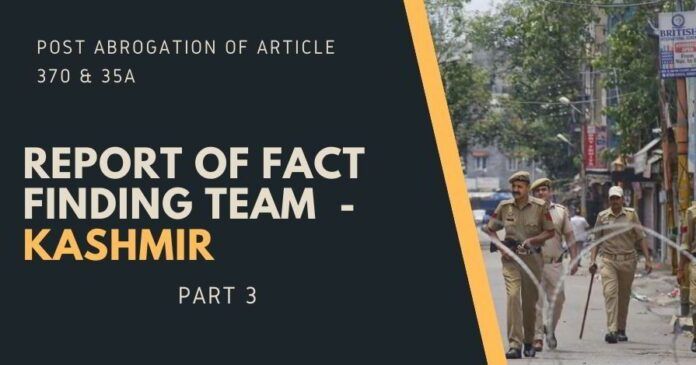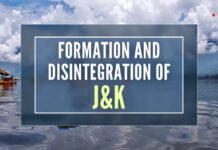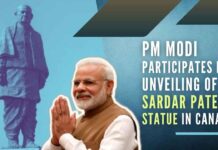
The Previous part of this article comprised of reports on meetings with the Shia Community, Sikh Community, Kashmiri Hindus and Sarpanches from different villages.
Report on meeting with Separatists
We met Zahid and two others who refused to be identified. He felt that Kashmir needs development and that some wrong actions by individuals combined with provocative speeches and statements create outrage amongst Kashmiris. He repeatedly asked whether, in the last 70 years, GOI has tried to win the hearts of Kashmiris. Zahid said that Pakistan has been attempting to lure Kashmiris for decades but hasn’t succeeded, however even India hasn’t been able to win us over, he felt.
With reference to the setting aside of Article 370 and 35A, the group we spoke to felt that there was no need to remove Article 370 as the Congress and NC had already eroded it and rendered it ineffective. They felt that the BJP was compelled to remove it only because it had been part of their manifesto for decades. They stated that the Kashmiris should’ve been consulted & taken on board, before its removal.
The residents of Kashmiri Hindu Transit Camp were emphatic that despite the caged atmosphere of the Transit Camps, the Kashmiri Hindus could only be returned to safe zones in townships and not otherwise.
One of them pointed towards the pampering of Pro-Pak elements by the GOI for 70 years. He said that it is shameful that, despite Kashmir being part of India, the Pak elements are still allowed to exist and thrive in the Valley. During anti-India agitations, NC, Congress, PDP and even those who are now with BJP, were involved, he said. So GOI should not single out and blame only Hurriyat.
In the midst of the conversation, one of them asked what the removal of Article 370 would achieve. He said, India is using force but cannot suppress the people forever. Referring to the killings of Abdul Ghani Lone, Maulvi Farooq and others, he said that it had been the work of Pak agents. Zahid said he feared for his safety because here, militancy is a ‘business’ with everyone involved. They want violence to continue because otherwise, the flow of money will stop. NIA raids have brought in accountability of funds which is a good step, he said. IB, CID, the army, security forces are all involved in this web of corruption. These ‘agencies’ are responsible for not allowing GOI to win over the hearts of Kashmiris.
Like all others we spoke to in Kashmir, these Separatists we were talking to also felt that it was a good step to arrest the Abdullahs and Mehbooba Mufti. However, they added that corruption charges should have been framed against them instead of simply putting them away because of Article 370. Arresting them without charges will make it seem as if Modi is just taking revenge, he said.
On being asked how Kashmiris have reacted to the setting aside of Article 370 and Article 35A, they gave elaborate answers. They felt that all Kashmiris are angry, so everyone including the police is deliberately making sure that normalcy is not restored. They felt betrayed by Pakistan. They have realized that the country is not sincere towards Kashmiris and so have thousands of other militants. It suits Pak to keep Kashmir in turmoil. In India, it is the ‘agencies’ that keep the unrest going. Earlier there were more than 55 thousand militants, now they’ve been whittled down to about two hundred. These militants cross over to Pak due to religious conviction but they end up getting killed, either by the ‘agencies’ or Pakistan. Zahid condemned Pakistan for not speaking up for the Uighur Muslims, he rued the fact that China routinely persecutes its Muslims with their ally Pakistan choosing to look the other way.
We asked the group about the kind of confidence-building measures they felt will ease the situation in Kashmir.
They said that Modi has changed, he’s no longer the man who committed ‘mistakes’ as CM of Gujarat. His high office has taught him ‘Insaniyat’, so he must talk to Pakistan.
According to the group, Abrogation created anger and fiery TV Debates only fan that anger. Such debates should be discouraged. Tact and discretion must be exercised while talking about Kashmir and Kashmiris.
They recommended that the GOI should start social work and political activity at the ground level but without any fanfare. Kashmiris were compelled to take up arms because of the 1987 rigged elections. They felt that GOI must not blame Pak for everything, very often it is the ‘agencies’ that create problems between the two nations.
According to the group we interviewed, at the time of encounters, militants mustn’t be killed. They should instead be persuaded to surrender and then given counselling. The government must identify those terrorists who suffered and rehabilitate them but without using middlemen, such steps will make the Central Govt. popular amongst Kashmiris.
The group felt that encouraging Panchayati Raj is a good step which will eliminate the middlemen.
As we were leaving, they told us that Kashmiris were glued to the TV to watch Home Minister Amit Shah’s speech on Aug 5 and they appreciated it. But, they felt he must give some assurance to Kashmiris that their land will not be taken away. They need some special Act like the ones in the North East or Himachal. They remarked that people to people contact is needed, so more delegations’ should visit Kashmir and listen to the people.
The overall tone and tenor of this meeting fitted in well with the separatist agenda that has been seen the valley for the past 70 years.
Report on meeting with Police personnel
We met Police personnel at all levels of service. We were told that initially, in the first week following August 5th, 2019, restrictions were imposed. After a while, these restrictions were eased. At present, there are no restrictions on the movement of any person and there is nothing like a lockdown.
The only issue now is that mobile phones are not working. However, 10,000 mobiles are functional, phones of high-ranking officials, health education workers and all key essential services are on, all landlines are working.
Shops are closed because there is a culture of fear in Kashmir. People are being forced to close shops. One person who opened his shop was assassinated. Things on the streets are also better than they were during previous troubled years like 2008, 2010 and 2016.
We were told that there is a terror culture in Kashmir. This is planned and executed by Pakistan. Anyone from the government or civil society who tries to break free of this culture of fear is brutalized and systematically hounded. Hit lists are put up, threats conveyed to silence and intimidate. These same persons who have links across the border have in the past been given prime time in Delhi and protected by the State Government. Those who are nationalists are ignored, silenced, intimidated or even eliminated. There are a lot of people who are religious zealots as well. Money has been pumped in by Pakistan. It is now possible as a Union Territory to demolish this eco-system but this will take time and will not end overnight.
We were told that there have been multiple kinds of threats. In Shopian, the people were being forced to stop picking fruit. They resisted and now apples have been picked and the fruit is being sent outside. Overnight threat posters are pasted, warning locals to shut shops and schools.
There are challenges being faced by the Police. We were assured that the Police is doing its work despite tough conditions. It was conveyed to us that in Kashmir we are dealing with an enemy country that has launched a proxy war in India. This is a long war and it has to be fought by the entire nation. Jammu & Kashmir Police is the first line of defence in this war.
Some of the younger police personnel we spoke to, were apprehensive that the removal of Article 370 is going to lead to a reduction in the jobs available for Kashmiris. They also felt that JK Police is being unnecessary demonized by the Indian media and politicians despite the fact that it is the police that faces the brunt of the violence.
Report from Baramulla
At Baramulla, we saw the town in a semi-open state. Students were milling around the Government Degree College in groups. On being asked about the current situation they were reluctant to talk and worried about the losses that they are facing due to lack of internet. One student informed us that this was the last day of filling up the NET form.
We had a brief interaction with Dr Itoo, the DC Baramulla. He informed us that for the past 15 days they had opened a small internet connectivity hub in the office premises with 20 consoles active. In the morning hours, students were given the priority to use the facility and in the afternoon business, persons could use the systems. We went and spoke to students at this facility.
We had conversations with locals in Baramulla. Almost all of them felt that there was no urgency for the government to take any step with reference to Article 370 and 35A. Most of them felt that if it had to be done, the winters would have been a better time. Some accused the government of deliberately destroying the economic activity in the region, others were very angry. Most were worried that their children are suffering due to the disruption in the educational activity.
We spoke to women who were more sedate. They laid out the pros and cons of the government’s actions before us. They said that though education was suffering temporarily, people could expect more employment in the future.
We went to the Kashmiri Hindu Transit Camp in Baramulla. The residents of the Camp were open, welcome and positive. As the conversation veered around August 5 2019, there was a clear gender divide. Most of the women felt that their children were suffering due to the disruption of studies in the region. The men looked forward to some positive action from the government for the return and rehabilitation of their community. They were emphatic that despite the caged atmosphere of the Transit Camps, the Kashmiri Hindus could only be returned to safe zones in townships and not otherwise. They envisage the nature of these townships as open to persons from all communities.
Mobile connectivity is an issue in Kashmir. Lack of Internet is an issue too. However, there are large sections who credit this step with saving of many lives in Kashmir at present. However, there is also a call for the restoration of mobile connectivity
We left the scenic and historic town of Baramulla with a feeling that this was a place for writing poems and elevating to a higher level of philosophical discourse. The place is heavenly. The Vitasta flows through the town. Tall trees surround a scenic quaint town. Baramulla has also witnessed brutality during the Kabali Raids and disruption for the past 30 years. In Kashmir, life defies logic.
Conclusion and Suggestions on Kashmir:
The Fact-finding team came away from Kashmir after an intense field study of the situation. In the period before we left, we had observed some issues being intensely debated outside Kashmir:
a. There were intense petitioning and activity for the release of jailed Kashmiri leaders by camps in Delhi. The Supreme Court has been petitioned.
b. There has been loud campaigning to establish that Kashmir is under “Lockdown‟ and there is “Genocide‟ in Kashmir.
c. There has been a call for restoration of mobile and internet connectivity.
d. There have been reports that 1300 children have been picked up and lodged in Jails outside Jammu & Kashmir.
We travelled across the length of Kashmir and met people from all social and political spectrums. We met polar opposites and observed some common points and we offer our suggestions based on these insights:
1. There is no sympathy for jailed Kashmiri leaders amongst the common people of Kashmir. Everyone we spoke to wants to see the GOI take them to Court and convict them for corruption.
2. There is no Genocide in Kashmir. The only genocide we observed was that of Kashmiri Hindus in 1990. At present Kashmiris are not under any kind of Lockdown or genocide.
3. Mobile connectivity is an issue in Kashmir. Lack of Internet is an issue too. However, there are large sections who credit this step with saving of many lives in Kashmir at present. However, there is also a call for the restoration of mobile connectivity.
4. Women are safe in Kashmir. We saw women on the roads driving cars. We saw them actively working in the Panchayats. They are not being harassed due to their religious identity.
5. Sarpanches are looking forward to BDC elections. However, they need urgent security and reassurances from the government.
6. The Minorities of Kashmir seek closer interaction directly with the GOI.
7. The Kashmiri Hindu genocide in Kashmir must be recognized by the GOI. This event is genocide as per the UN Convention on genocide. Their experiences cannot be equated with the brutalization of Kashmiri Muslims in the State by non-State actors. The Kashmiri Hindus were targeted for their religious identity.
8. There is a silent constituency of wisdom amongst Kashmiri Muslims in Kashmir. They seek closer interaction with the government.
9. Across all persons we spoke to there is desperation because the “stooges of separatism” in Kashmir who are placed in Delhi are wooed by the GOI in Delhi. (One person we spoke to asked us bitterly why Mehbooba Mufti’s daughter is getting so much importance in Delhi.)
10. There is no evidence of children being picked up by security forces and randomly arrested. Some cases are there which are being addressed through the due process of law.
11. Media persons are freely travelling and reporting in Kashmir. No-one stopped us during our extensive travel through Kashmir. However, media reports need to be positive.
12. There is brutalization of people by the OSUT and the terrorists are still present in rural areas. They are not allowing people to resume daily lives.
Overall Kashmir is going through intense churning. The Kashmiris across the board seek healing from a corrupt, oppressive, social and political culture that has emerged in Kashmir for the past 70 years and more intensely in the last 30 years. They want the GOI to make the UT model work in Kashmir. They look towards the Centre to reach out to them with real changes. We recommend that the process of healing between the GOI and the Kashmiris be facilitated. Any group or set of persons nationally or internationally trying to derail this process should not be allowed to betray the Kashmiris.
Stay tuned for the Report of Fact-finding team on Jammu and Ladakh further in this series…..
To be continued . . . . .
- Rs.7961 crores worth Rs.2000 notes not yet returned, says RBI. 97.76% of the notes in circulation returned - May 2, 2024
- Manipur completes the first phase of deportation of illegal immigrants - May 2, 2024
- SC registry rejects Centre’s plea for allocation of Satellite Spectrum, avoiding auction - May 1, 2024











Your link to previous part sends me to some washington…… Site with unrelated news.